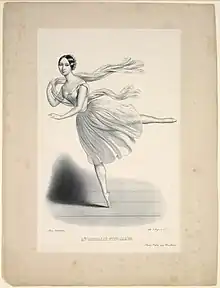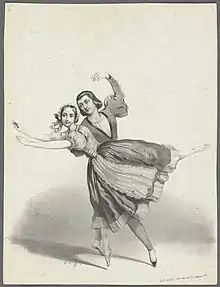Nathalie Fitzjames
Nathalie (or Natalie) Fitzjames (or Fitz-James, originally Fijan[1]) was a Romantic era French ballerina who was especially admired in Italy.[2] Fitzjames appeared in La Resemblance at the Her Majesty's Theatre in London in May 1838, receiving the following review of her first appearance:
"She resembles, both in expression, figure, and style of dancing, our favourite of three years past, Pauline Leroux. Her pretensions as an artiste as not so high as those of Fanny Elssler or Duvernay, but she has been taught in the best school, and in the present state of the ballet she must be considered a decided acquisition here. She is full of spirits and gaiety, and flies about the stage in a manner that is very captivating. The dancing of her feet is near perfection, but her arms are not moved with freedom, and she is deficient to a certain extent both in dignity and grace."[3]


%252C_la_Cracovienne_(NYPL_b12148326-5234623).jpg.webp)
Fitzjames danced the 'peasant pas de deux' in Act 1 of the premiere of Giselle with Auguste Mabille at the Paris Opéra in 1841.[4] She starred in La reine de Chypre, at the Salle Le Peletier of the Paris Opéra on 22 December 1841,[5] and afterwards toured in Italy, receiving acclaim in both Florence and Naples.[2][6]
In autumn 1850 Fitzjames travelled to New York, where she made her debut in Paquita at the Astor Place Opera House as part of Max Maretzek's opera company. Her part was staged for her by Lucien Petipa.[2] Fitzjames danced the lead role in Terpsichore in another Italian Opera Company production in early 1851, at the Chestnut Street Theatre in Philadelphia.[7] American audiences are reported to have found her too thin for their taste.[2]
Fitzjames was a believer in modernising women's dress. In the spring of 1851, she danced with a so-called "Bloomer Troupe" in Brooklyn, sporting the recently invented and controversial bloomer costume.[2]
References
- "Fitzjames Sisters : The International Encyclopedia of Dance - oi". oxfordindex.oup.com. doi:10.1093/acref/9780195173697.013.0620. Retrieved 2019-06-02.
- Lillian Moore (1965). Images of the dance: historical treasures of the dance collection 1581–1861. New York Public Library. ISBN 0-87104-093-X. Wikidata Q64698163.
- "HER MAJESTY'S THEATRE". The Morning Post, London. 9 May 1838.
- Beaumont, Cyril W. (Cyril William), 1891-1976. (1996). The ballet called Giselle. Dance Books. ISBN 1852730048. OCLC 35655775.CS1 maint: multiple names: authors list (link)
- Spire Pitou (1985). The Paris Opéra: An Encyclopedia of Operas, Ballets, Composers, and Performers. Rococo and Romantic, 1715-1815. Greenwood Publishing Group. ISBN 0-313-24394-8. OL 10418862M. Wikidata Q81388231.
- "Lyrical and Dramatic Record". Morning Post. 1 August 1845.
- "Opera in Philadelphia : Chronology of Opera in Philadelphia : Performance Annals". www.frankhamilton.org. Archived from the original on 2016-06-24. Retrieved 2019-06-02.